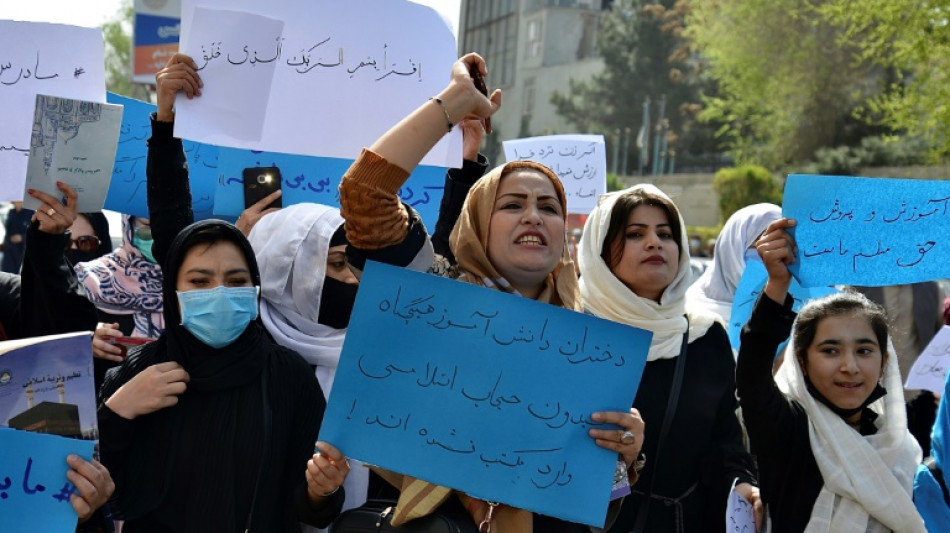
-
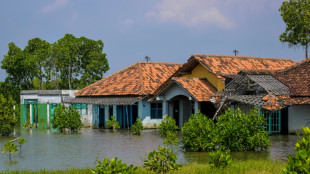 Can a giant seawall save Indonesia's disappearing coast?
Can a giant seawall save Indonesia's disappearing coast?
-
Motive probed for US shooting that killed two children, injured 17
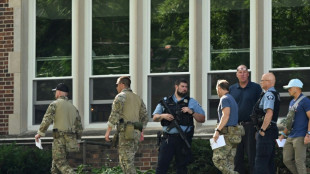
-
 Bisexual ex-Australian Rules player praised for 'courage and bravery'
Bisexual ex-Australian Rules player praised for 'courage and bravery'
-
South Korea to ban mobile phones in school classrooms

-
 Alcaraz banishes US Open demons to reach third round
Alcaraz banishes US Open demons to reach third round
-
Kipchoge feeling the pressure ahead of Sydney Marathon
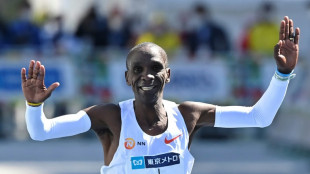
-
 Clooney and Netflix team up for Venice festival spotlight
Clooney and Netflix team up for Venice festival spotlight
-
Trump stamps 'dictator chic' on Washington

-
 UN Security Council to decide fate of peacekeeper mandate in Lebanon
UN Security Council to decide fate of peacekeeper mandate in Lebanon
-
Alcaraz sprints into US Open third round as Djokovic advances

-
 Qantas says profits up, strong travel demand ahead
Qantas says profits up, strong travel demand ahead
-
'Perfect storm': UK fishermen reel from octopus invasion

-
 Alcaraz crushes Bellucci to reach US Open third round
Alcaraz crushes Bellucci to reach US Open third round
-
Townsend reveals Ostapenko 'no class' jibe after US Open exit
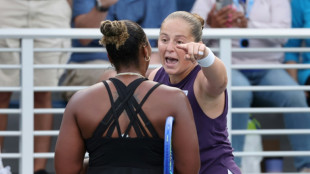
-
 Israel ups pressure on Gaza City as Trump talks post-war plan
Israel ups pressure on Gaza City as Trump talks post-war plan
-
NATO says all countries to finally hit 2-percent spending goal
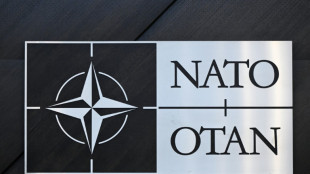
-
 Rangers humiliated, Benfica deny Mourinho's Fenerbahce Champions League place
Rangers humiliated, Benfica deny Mourinho's Fenerbahce Champions League place
-
AI giant Nvidia beats earnings expectations but shares fall

-
 Kane rescues Bayern in German Cup first round
Kane rescues Bayern in German Cup first round
-
Argentina's Milei pelted with stones on campaign trail

-
 Stock markets waver before Nvidia reports profits climb
Stock markets waver before Nvidia reports profits climb
-
Argentina hunts Nazi-looted painting revealed in property ad

-
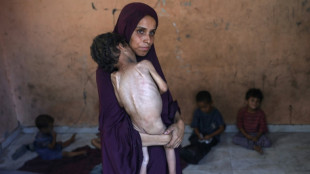 NGO says starving Gaza children too weak to cry
NGO says starving Gaza children too weak to cry
-
French PM warns against snap polls to end political crisis
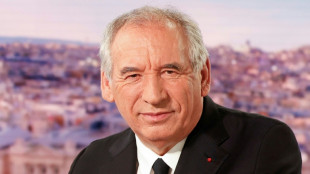
-
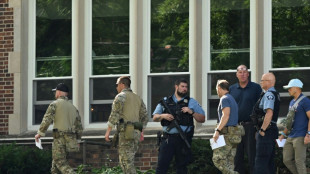 Gunman kills two children in Minneapolis church, injures 17 others
Gunman kills two children in Minneapolis church, injures 17 others
-
Djokovic advances at US Open as Sabalenka, Alcaraz step up title bids

-
 Venice Film Festival opens with star power, and Gaza protesters
Venice Film Festival opens with star power, and Gaza protesters
-
Globetrotting German director Herzog honoured at Venice festival

-
 Djokovic fights off qualifier to make US Open third round
Djokovic fights off qualifier to make US Open third round
-
Duplantis, Olyslagers seal Diamond League final wins

-
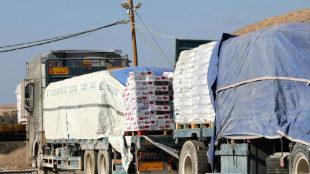 Israel demands UN-backed monitor retract Gaza famine report
Israel demands UN-backed monitor retract Gaza famine report
-
Vingegaard reclaims lead as UAE win Vuelta time trial
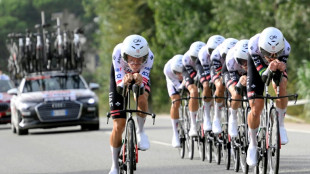
-
 Shooter kills 2 children in Minneapolis church, 17 people injured
Shooter kills 2 children in Minneapolis church, 17 people injured
-
Defence giant Rheinmetall opens mega-plant as Europe rearms

-
 Van Gogh Museum 'could close' without more help from Dutch govt
Van Gogh Museum 'could close' without more help from Dutch govt
-
Indonesia's Tjen exits US Open as Raducanu moves on

-
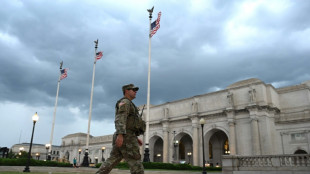 Trump administration takes control of Washington rail hub
Trump administration takes control of Washington rail hub
-
Stock markets waver ahead of Nvidia earnings

-
 Conservationists call for more data to help protect pangolins
Conservationists call for more data to help protect pangolins
-
US Ryder Cup captain Bradley won't have playing role

-
 French star chef to 'step back' after domestic abuse complaint
French star chef to 'step back' after domestic abuse complaint
-
Rudiger returns, Sane dropped for Germany World Cup qualifiers

-
 S.Africa calls US welcome for white Afrikaners 'apartheid 2.0'
S.Africa calls US welcome for white Afrikaners 'apartheid 2.0'
-
'Resident Evil' makers marvel at 'miracle' longevity

-
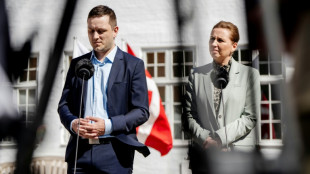 Denmark apologises for Greenland forced contraception
Denmark apologises for Greenland forced contraception
-
Hungary web users lap up footage of PM Orban's family estate

-
 Alexander Isak selected by Sweden despite Newcastle standoff
Alexander Isak selected by Sweden despite Newcastle standoff
-
Italy's Sorrentino embraces doubt in euthanasia film at Venice

-
 Trump urges criminal charges against George Soros, son
Trump urges criminal charges against George Soros, son
-
Wildfires pile pressure on Spanish PM


Girls' education ban reveals deep rifts within Taliban
The Taliban prohibition on girls' education shows the movement's ultra-conservatives retain tight control of the Islamist group, and exposes a power struggle that puts at risk crucial aid for Afghanistan's desperate population, experts say.
The ban has triggered international outrage and even left many in the Taliban movement baffled by the decision.
"The order was devastating," a senior Taliban member told AFP. "The supreme leader himself interfered."
All Taliban officials who spoke to AFP on the subject did so on condition of anonymity, due to the sensitivity of the topic.
Secondary schools for girls were ordered to shut last month, just hours after being reopened for the first time since the Taliban's return to power in August.
The shocking U-turn came after a secret meeting of the group's leadership in the city of Kandahar, the Taliban's de facto power centre.
Officials have never justified the ban, apart from saying the education of girls must be according to "Islamic principles"
But one senior Taliban official told AFP that Supreme Leader Hibatullah Akhundzada and some other senior figures were "ultra-conservative on this issue" and dominated the discussion.
Two groups -- the urban and the ultra-conservatives -- have emerged in the movement, he said.
"The ultra-conservatives have won this round," he added, referring to a group of clerics including Chief Justice Abdul Hakim Sharai, Minister for Religious Affairs Noor Mohammad Saqeb and Minister for Promotion of Virtue and Prevention of Vice Mohammad Khalid Hanafi.
- Reimposing Kandahar's influence -
The clerics feel excluded from government decisions and voicing their opposition to girls' education is one way to restore their influence, said Ashley Jackson, a London-based researcher who has worked extensively on Afghanistan.
She told AFP the "outsized influence of this out-of-touch minority" has prevented the country from moving ahead with something the vast majority of Afghans favour -- including much of the leadership.
"It shows that Kandahar remains the centre of gravity for Taliban politics," said International Crisis Group analyst Graeme Smith.
A senior Taliban member said the hardliners were trying to appease thousands of fighters who hail from the deeply conservative countryside.
"For them, even if a woman steps out of her home it is immoral. So, imagine what it means to educate her," he said.
The Taliban member said Akhundzada was against "modern, secular education" as he associated it with life under former Western-backed presidents Hamid Karzai and Ashraf Ghani.
"That's his worldview."
The Taliban returned to power last year as US-led forces ended an occupation in place since an invasion ousted the hardliners in 2001.
In the 20 years between the Taliban's two reigns, girls were allowed to go to school and women were able to seek employment in all sectors, though the country remained socially conservative.
Activist and Islamic scholar Tafsir Siyaposh noted girls in Afghanistan have always studied in single-sex classes and followed an Islamic curriculum, so the ban shows the Taliban just wanted to "oppress the rights of women by giving excuses".
- Blow to foreign aid -
A Taliban source in Pakistan confirmed differences at the leadership level on the issue, but said the movement was in no danger of fragmenting.
"There is a debate on this issue ... but we are trying to overcome our shortcomings," he said.
Still, analysts say the ban was a blow to Taliban efforts to gain international recognition and to raise aid to address Afghanistan's humanitarian crisis.
Jackson said neither Akhundzada nor those closest to him "fully understood or appreciated" the consequences of their edict for an international community that has linked official recognition to the group's respect for women's rights.
Even some senior Taliban officials agree.
"We are telling them (the ultra-conservatives) that running a country is different from running a madrassa," said one Taliban official from Kandahar, using the term for an Islamic school.
"Everything was going smooth until this harsh order came. And it came from our leader so we have to follow it -- but we are trying to change it," he said.
The ban reduces the willingness of governments to cooperate with the Taliban said the ICG's Smith.
"It raises the question of who exactly they should speak with inside the Taliban."
P.Anderson--BTB
